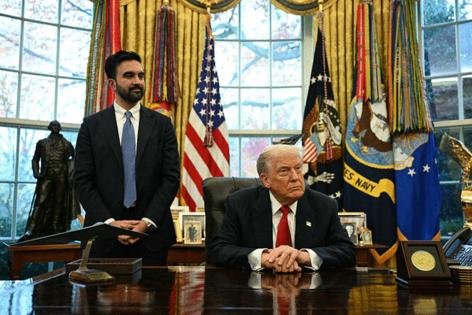Beware of those pushing for bipartisan bridge-building
VANCOUVER, British Columbia — Where’s this latest push coming from for everyone on the political spectrum to start getting along just for the sake of it? We’re constantly told that diversity is strength. So why are they now trying to put a silencer on the arguing that exemplifies it?
Democratic governor of Hawaii, Josh Green, recently suggested that Republicans and Democrats should “nominate candidates committed to healing the deep partisan divide,” to reduce the risk of a “political civil war,” according to the Associated Press.
It first came up after the contentious “hanging chads” in Florida’s recount during the presidential election that saw George W. Bush scrape by against Al Gore in 2000. It circled back yet again after Bush had left the White House to Barack Obama in the wake of the Iraq War. Then it emerged once more when Joe Biden took over from Trump in the wake of the unrest at the Capitol on Jan. 6, 2021.
As a Fox News co-host in 2007, I was repeatedly told by an executive that their mandate — and hence mine — was to help the nation heal after Bush’s Global War on Terror had sparked heated divisions. And here I thought that the whole idea of talk shows was to provoke thought and debate, and generate ratings that translate into revenue for shareholders — not serve as a cross-country psychotherapy program.
Decades of calls for healing have changed little, because we’re still hearing about the issue a couple of decades later. Arguably, the national divide has become worse than ever. In fact, one could even argue that the very recipe for political polarization is to actively attempt to suppress differences rather than engage with them.
The reason for this is simple. It’s the very act of avoiding polarization that comforts a corrupt system in desperate need of reform.
Those leading the kumbaya calls are elected establishment fixtures. That establishment is backed by political donations of wealthy elites who mostly seek to preserve their own power and influence. Not only do their wealth and investments depend on systemic stability, but bipartisan centrism also allows them to shape policy through involvement and lobbying on both sides of the political divide. Polarization makes bipartisan investment impossible.
Also keep in mind that their political donations are laundered through nonprofits that churn out influential policy papers favoring the positions and interests of their donors. And it’s illegal for these same nonprofits to be seen engaging in partisan politics. Erasing ideological lines helps maintain a facade of neutrality, allowing their political puppets to dance around on command while their strings stay cleverly hidden.
So where’s the average American citizen in all this? If there’s one thing on which Americans have bipartisan agreement, it’s that this corrupt system doesn’t serve them and desperately needs a makeover. In an Ipsos survey released in June, 64 percent of Americans agreed that “the main divide in our society is between ordinary citizens and the political and economic elite,” while 70 percent believe that these same elites “don’t care about hard-working people.”
So the average American is clearly populist and fed up, regardless of partisan leanings.
The populists on the right and left actually agree on a lot. They just have different ideas about how to get to their destination. Which is why it shouldn’t come as any surprise that Trump and the newly elected mayor of New York City, Zohran Mamdani, got along so well at their first White House meeting last week. Trump, who previously called Mamdani a “communist" (he then called Trump a "fascist"), now says that his views of the mayor-elect have changed, adding: “I think he’s going to surprise some conservative people.”
Hardly surprising. Populists on both the right and left have a ton in common. Both are against endless wars, global governance and corporate power’s outsized influence in politics. Both want systemic change and better treatment for the average worker.
Oh, look! Unity and agreement! And no one had to force it. Why isn’t the establishment pushing for more of this? I think we all know the answer.
Imagine what would happen if the populist right and left realized that they have far more in common right now than they figured? Instead, they’re spoon-fed the narrative that their real enemy is each other. Who’s promoting that? The establishment figures of their own respective parties, naturally. Their real foes are inside the tent, holding the hors d’oeuvres while whispering to keep fighting with the opposition’s anti-establishment.
Imagine what could be achieved if populists caught onto the manipulation. In France, for example, the anti-establishment right and left have collaborated recently to dominate and control the parliamentary agenda, effectively limiting the options of the country’s pro-establishment President Emmanuel Macron. In Italy, the Five Star Movement and La Lega formed a joint populist government to push against technocratic domination of the European Union’s supranational governance. Anti-globalist cooperation between the right and left also drove Brexit in Britain.
Populist unity against a backdrop of differences is potentially transformative. But not in the way that the establishment and its political handmaidens would ever want. Which is why, instead, we’re just going to keep hearing about how the only real cooperation that needs to take place is the kind that’s really only of benefit to them and to the system that serves them.
































Comments